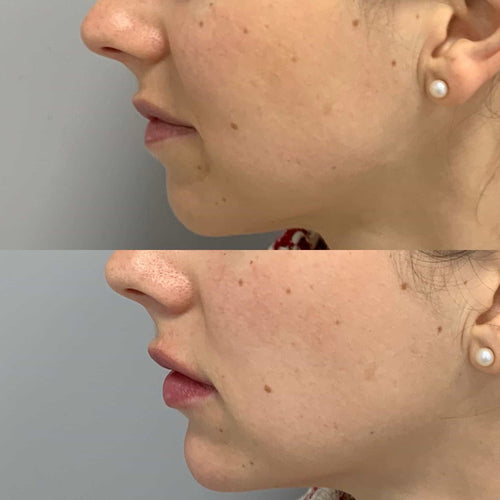Consult Dr. Laura Geige for Your Dermal Fillers Now
Individuals with Certain Medical Conditions
Bleeding Disorders
Individuals with certain medical conditions should exercise caution before undergoing cheek fillers.
Bleeding disorders, including hemophilia and von Willebrand disease, can pose a significant risk. These conditions impair the body’s ability to clot blood properly, leading to prolonged or excessive bleeding at the injection site. This can result in bruising, hematomas (collections of blood under the skin), and other complications.

Individuals with active infections in the area where fillers are to be injected should also avoid the procedure. Infections can spread and become more severe when foreign substances like fillers are introduced into the body.
Those taking medications that thin the blood, such as anticoagulants or antiplatelet drugs, may experience increased bleeding risk with cheek fillers. It’s crucial to consult with a physician regarding the potential interactions between these medications and the procedure.
Book a Dermal Filler Appointment with Dr. Laura Geige Today
People with a history of allergic reactions to hyaluronic acid (a common filler ingredient) should avoid cheek fillers. Reactions can range from mild redness and swelling to severe anaphylaxis, a life-threatening allergic response.
Autoimmune Diseases
Individuals with certain medical conditions and autoimmune diseases may need to exercise caution or avoid cheek fillers altogether. This is because these conditions can increase the risk of complications or interfere with the body’s ability to heal properly.
Some examples of medical conditions that may pose a risk include:
**Active Skin Infections:** Having an active infection in the area where fillers are being injected can increase the risk of spreading the infection or introducing bacteria into the injection site.
**Blood Clotting Disorders:** Individuals with blood clotting disorders, such as hemophilia, may be at a higher risk of bruising, bleeding, or hematoma (blood collection) after filler injections.
**Diabetes:** People with uncontrolled diabetes may have difficulty healing and are more susceptible to infection. It’s important for them to manage their blood sugar levels closely before and after any cosmetic procedure.
**Autoimmune Diseases:** Individuals with autoimmune diseases, where the immune system attacks the body’s own tissues, may experience an exaggerated inflammatory response to fillers. This could lead to swelling, redness, pain, or even tissue damage.
Examples of autoimmune diseases that may pose a risk include:
- Lupus
- Rheumatoid Arthritis
- Scleroderma
It’s crucial for anyone considering cheek fillers to have a thorough consultation with a qualified and experienced injector. The injector will assess your medical history, current medications, and overall health to determine if cheek fillers are safe and appropriate for you.
Active Infections
Individuals with certain medical conditions and active infections should avoid cheek fillers.
Active Infections:** A current infection, especially in the area to be treated, can increase the risk of complications. The filler may exacerbate inflammation and potentially spread infection.
Autoimmune Diseases:** People with autoimmune diseases such as lupus or rheumatoid arthritis are more susceptible to adverse reactions to fillers. Fillers can trigger an immune response, leading to inflammation, swelling, and pain.
Blood Clotting Disorders:** Certain blood clotting disorders increase the risk of bruising and bleeding complications after cheek filler injections.
Skin Conditions:** Active skin conditions in the treatment area, such as eczema or acne, should be managed before considering fillers. These conditions can make the skin more sensitive and prone to irritation.
Pregnancy and Breastfeeding:** The safety of cheek fillers during pregnancy and breastfeeding is not well-established. It’s generally recommended to avoid them during these periods.
Allergies to Fillers or Lidocaine:** Some individuals may have allergies to the ingredients in cheek fillers, such as hyaluronic acid or lidocaine. Allergic reactions can range from mild skin irritation to severe anaphylaxis.
**Diabetes:** People with diabetes may experience slower wound healing and increased susceptibility to infection, which could complicate filler procedures.
It’s crucial for individuals with any of these conditions to consult with a qualified medical professional before undergoing cheek filler treatments. The doctor can assess their individual health status and determine the safety and suitability of fillers based on their specific circumstances.
Book Your Dermal Filler Consultation with Dr. Laura Geige
Pregnant or Breastfeeding Women
Super Sleep Yoga Highland Spring Magazine The Lady London The CBD Consultancy Hopeless Book Decléor Direct
- Who Shouldn’t Get Botox? - November 17, 2025
- What Is Sexual Autonomy And How It Influences Modern Dating - November 16, 2025
- Weed Drinks Vs Cannabis Edibles: Pros And Cons - November 13, 2025
